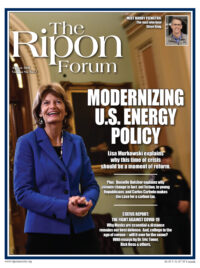
In this era, in which we consume information from Twitter and constant breaking-news alerts, it is challenging for leaders to follow and respond thoughtfully to strategic challenges.
The population of the United States and the world is growing and changing. China is emerging as a global power, while the European Union shows signs of weakening. Here, forecasts show a fast-growing gap between expected federal revenue and obligations in coming decades.
And the world is warming. The average global temperature has already risen 2 degrees Fahrenheit since 1900 and is on track to rise between 5.2 and 6 degrees Fahrenheit by 2100. I, along with all Floridians, know that as the oceans warm, they expand. In fact, sea levels are expected to rise 43 inches by 2100. And that is without accounting for melting glaciers and polar icecaps.
At its core, climate change is not political. The best adjective to describe it is inevitable. Blame for the issue is diverse, most often on fossil fuels and extractive industries. However, I think of it more as the consequence of our common desire for better lives and higher standards of living which has led us to develop resources that have unintended impacts on the environment.
We have to recognize that previous economic growth is correlated to increased greenhouse gas emissions and that we will need to break this relationship by first understanding the costs of emitting greenhouse gasses into the atmosphere.
Regardless, it cannot be ignored, and I am grateful that our party has moved past its two-decade-long “experiment” with climate denialism. House Republican Leader Kevin McCarthy, along with Reps. Greg Walden, Fred Upton, and Garret Graves, among others, deserve praise for their leadership on the issue — particularly because taking the necessary, early steps to return our party’s orthodoxy to one focused on stewardship of the environment took political courage.
But that courage will be rewarded. The majority of voters — especially, as Leader McCarthy likes to remind us, younger voters — want their elected leaders to lead on this issue. For many voters, whether elected officials acknowledge climate change has become a litmus test for whether they are honest about the challenges we face, or just honest in general.
In my case, it means we have to recognize that previous economic growth is correlated to increased greenhouse gas emissions and that we will need to break this relationship by first understanding the costs of emitting greenhouse gasses into the atmosphere. Those costs can be measured in many ways, and we will start seeing them in coastal property values, mortgage and flood insurance rates, infrastructure costs, and disaster assistance costs.
It is one of the reasons I became a proponent of a carbon tax, because economists agree it is the most efficient way to reduce greenhouse gas emissions.
Because I am motivated by standards of living, I care deeply about economic growth. It is one of the reasons I became a proponent of a carbon tax, because economists agree it is the most efficient way to reduce greenhouse gas emissions. And the revenue can be used to replace other taxes or fund new American infrastructure.
But that may not be the preferred solution for everyone. And deciding what policies to support is a challenge. Meaningful climate policies have consequences, so they will be controversial. Republicans have now discussed and introduced a number of policy proposals, and we need to be comfortable considering them all and eventually embracing some of them.
It is time for a sober assessment of the consequences of climate change. We need an equally sober assessment of what we can and should do to mitigate it because it certainly seems like our best bet now is simply to limit those consequences. Some damage may be unavoidable. “How much” is definitely up to us.
Carlos Curbelo was a member of the U.S. House of Representatives representing Florida from 2015-2019, where he co-founded and co-chaired the House Climate Solutions Caucus, and is currently an advisor to the Alliance for Market Solutions.




